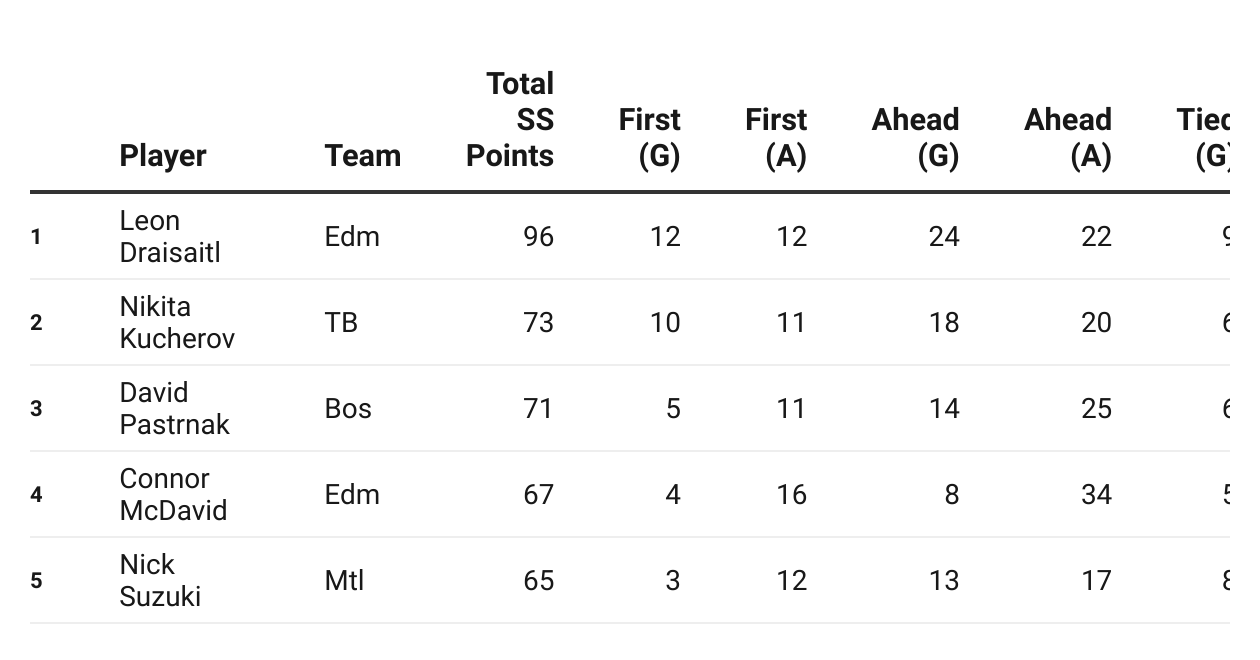The NHL had only one 50-goal scorer this season in Leon Draisaitl of the Edmonton Oilers.
Not only did Draisaitl score a lot for the Oilers, but he scored a lot when it really mattered. He had the most goals and points that came at the most important moments, which is why he is The Hockey News’ 2024-25 NHL Situational Scoring champion.
You know how they say that it doesn’t matter how, but how many? Well, with Situational Scoring, it doesn’t matter how many. It matters how many mattered, because the stat charts only the goals that are important.
Here’s the chart with the top 25 to click on – check it out, see some of the surprising names and keep this in mind when people talk about the Hart Trophy race for the NHL’s most valuable player. For the full explanation for Situational Scoring and the glossary, keep reading below, and leave a comment about your thoughts on the list.
 NHL Situational Scoring: Top 25 Players In 2024-25Situational Scoring tracks the points that matter the most. Goals and assists are assigned a value depending on the situation and added up in the total (SS points). Scroll to the right for more numbers.
NHL Situational Scoring: Top 25 Players In 2024-25Situational Scoring tracks the points that matter the most. Goals and assists are assigned a value depending on the situation and added up in the total (SS points). Scroll to the right for more numbers.
As the name suggests, it measures Situational Scoring, specifically which players produce offense at the most crucial times in the game. For example, an overtime-winning goal, like the one McDavid scored for Canada to finish the 4 Nations Face-Off with gold, is worth more than scoring when it’s a blowout.
That’s why a guy like Troy Terry of the Anaheim Ducks can be 105th in the actual scoring race but is tied for 23rd in Situational Scoring. (It’s actually phenomenal what Terry did, considering the Ducks were third-last in league scoring and didn’t score nearly as many big goals as better teams.) Or Vegas Golden Knights center Jack Eichel can be eighth and Colorado Avalanche defenseman Cale Makar ninth in NHL scoring but not crack the top 25 in this department.
As always, there are a couple of things to note, the most important being that goals are weighted more heavily than assists, with goals worth one point and assists worth half a point.
In this system, goals can be worth more than one point and assists worth more than half a point. For example, the first goal of a game is automatically worth two points, one for being the first goal of the game and one for putting that player’s team ahead in a game. An overtime goal is worth three: one for putting the team ahead, one for being the game-winner and one for the overtime goal. If that is the only goal in a 1-0 game, as it was for Mitch Marner against the Montreal Canadiens last weekend, it’s worth four.
It can all be a little confusing, so here’s a glossary:
FIRST: When a player scores the first goal of the game.
AHEAD: Any goal that puts a team ahead at any point in the game, including overtime.
TIED: Any goal that pulls a team into a tie at any point in the game.
COMEBACK: A goal that is scored when a team is trailing by two goals or more and is part of a series of goals that eventually ties the game, regardless of the ultimate outcome of the game.
WINNER: A game-winning goal, but not by the NHL’s definition. The game-winner in this category is the goal that puts a team ahead in a game to stay. So in other words, you could have a 7-6 game and maybe the first goal of the game was the game-winner.
OT: Overtime goal.
SO: Only shootout game-winning goals are counted in this category.
NHL: Where the player stands in the actual NHL scoring race.
Want to see how the rankings changed since the 4 Nations Face-Off break? Click here.
Read the full article here



